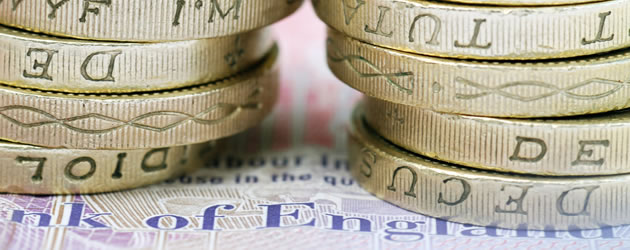Pound Sterling to Euro (GBP/EUR) Conversion Rate Predicted to Advance on ECB Easing Speculation
The Pound Sterling to Euro (GBP/EUR) exchange rate ticked higher by around 1.0% on Monday afternoon.
After British economic data produced mostly positive results the Pound Sterling edged higher versus some of its major peers. It is worth noting, however, that the Pound is still holding a competitively weak trade weighting with EU referendum uncertainties predicted to limit gains from positive domestic data.
January’s Net Consumer Credit, Net Lending Securities on Dwellings, Mortgage Approvals and M4 Money Supply data all bettered the respective median market forecasts. Much more disappointing, however, was February’s Lloyds Business Barometer which dropped from 45 to 28. This highlights the impact of ‘Brexit’ concerns on businesses.
Commenting on the positive mortgage approvals data, Steve Griffiths, Head of Sales and Distribution at Kensington said: ‘These figures show a strong start to the year for lending, as well as a move towards a ‘new normal’ for this sector. However, whilst it is good to see more people securing the mortgages they need, we need to make sure that this growth is not just limited to individuals that tick the boxes of high-street lenders’ standard mortgage applications.’
The Pound Sterling to Euro (GBP/EUR) exchange rate is currently trending in the region of 1.2812.
Although European inflation data was particularly disappointing, with consumer prices having dropped the most in a year, the EUR/GBP conversion rate is trending within limited range. This is mostly due to stronger demand for carry trading as falling global equity markets limit the appeal of directly investing in high-yielding assets.
However, the Euro is unlikely to post any significant gains today after the less-than-ideal inflation estimate caused many to predict that the European Central Bank (ECB) will employ aggressive stimulus measures in March.
The Eurozone Consumer Price Index Estimate for February dropped from 0.3% to -0.2% on the year.
‘Not only headline but also core inflation is much lower than the ECB has been projecting — it is not just energy, it is a wider problem reflecting second round effects and weak demand,’ said Nick Kounis, head of macro research at ABN Amro Bank NV in Amsterdam. ‘This will provide the ECB with an extra push to deliver more aggressive easing than expected at its March meeting.’
Pound Sterling to US Dollar (GBP/USD) Conversion Rate Predicted to Strengthen on Disappointing US Pending Home Sales
The Pound Sterling to US Dollar (GBP/USD) exchange rate strengthened by around 0.4%% on Monday afternoon.
In response to Euro weakness and safe-haven demand the US Dollar strengthened versus many of its currency peers in the early stages of Monday’s European session.
However, USD gains were short-lived after domestic data disappointed showing that US Pending Home Sales unexpectedly contracted in January.
The Pound Sterling to US Dollar (GBP/USD) exchange rate is currently trending in the region of 1.3854.
Pound Sterling Exchange Rate Forecast: UK Manufacturing PMI to Provoke Volatility
With an absence of any further domestic data to cause changes, the Pound Sterling is likely to continue trending in response to market sentiment and wider market movement. However, any news regarding the EU referendum, especially if more UK officials side with the ‘leave’ campaign, the Pound could depreciate significantly.
Tuesday should see Sterling changes in response to February’s British Manufacturing PMI which is expected to show output was reduced from 52.9 to 52.3.
The Pound Sterling to Euro (GBP/EUR) exchange rate was trending within the range of 1.2653 to 1.2835.
The Pound Sterling to US Dollar (GBP/USD) exchange rate was trending within the range of 1.3834 to 1.3946 during Monday’s European session.



